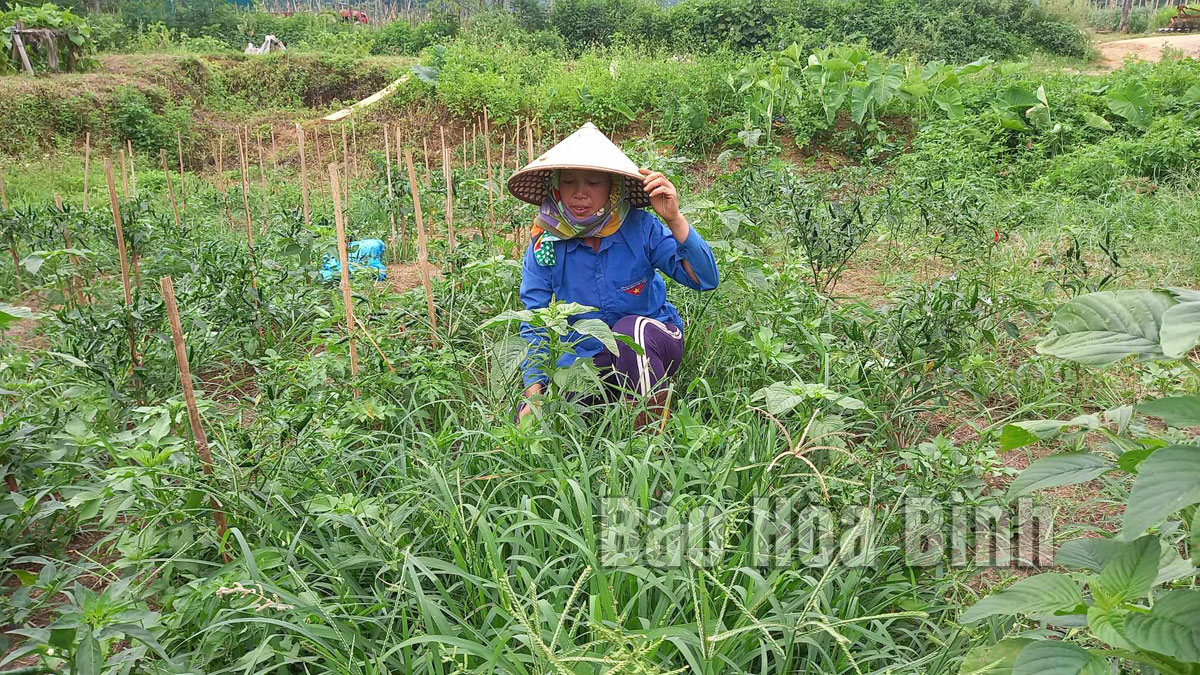
(HBO) – Quyet Chien, a mountainous commune in Tan Lac district and about 17km from the district downtown, has a total area of 2,000 hectares and a rough terrain with high rock mountains.
The long, narrow valley strip with small fields is the commune's major agricultural production hub, which accounts for about 11.4% of the commune’s total natural area, and the rest is mainly forest land with forest and bold rock mountains.
Bieng villagers of Quyet Chien commune in Tan Lac district have switched
inefficient rice farming areas into vegetable farms with higher economic
values.
Provincial Road 440, which crosses the commune, has brought advantages to the
locality in trading activities with neighbouring localities and regions.
Currently, the majority of the 266 households with 1,730 people in Quyet Chien
are living on agriculture.
Over the years, Quyet Chien has focused on implementing national target
programmes, especially the new-style rural area building scheme. It has
strengthened communications to encourage locals to transform the cultivation
structure in a suitable manner. At the same time, the commune has support local
residents in accessing capital from the Vietnam Bank for Social Policy to
invest in economic production.
Bui Van Hoang, a Bieng villager, said that his family has developed 2,500sq.m
of Korean white radish which has generated high economic values.
Hoang’s family is not the only in Quyet Chien to have successfully transformed
their inefficient farms into vegetable farms to provide products to Hanoi and
major cities across the country. Thanks to this solution, many have got out of
poverty. The average per capita income of the commune has reached 36.5 million
VND (1,509 USD). As a result, the rate of poor households in the locality has
been reduced to 18.3%.
Dinh Cong Khoa, Chairman of the provincial People’s Committee, said that the
commune is implementing three national target programmes, including the one on
boosting socio-economic growth in the ethnic minority-inhabited and mountainous
areas in the 2021-2030 period. It have covered all aspects of the social life,
creating positive impacts on these areas.
After two years of implementation, the programme has received positive response
from local residents, contributing to optimising potential and advantages of
the locality, boosting economic development, ensuring social welfare, improving
people’s incomes, and maintaining political stability, social order and safety
in the locality.
In Hoa Binh province, 11 traditional craft villages with more than 400 small-scaled production households have put in place a clean and green production model, establishing new standards for sustainable development. Waste collection sites and wastewater treatment facilities have been meticulously managed by local residents.
To make it easier for the residents to handle administrative procedures, Yen Bong Commune (Lac Thuy District) has identified the administrative reform as one of its key tasks. By implementing a range of synchronized solutions, the commune has seen the positive changes in the administrative reform, meeting the needs of its people.
Mai Chau district has firmly established itself as a standout destination on Vietnam’s tourism map, attracting both domestic and international visitors with its breathtaking landscapes, rich ethnic culture, and warm hospitality. However, beyond its natural and cultural charm, a secure and well-managed tourism environment has added to Mai Chau’s appeal.
As Vietnam enters a new phase of economic and administrative reform in 2025, Hoa Binh province is stepping up its efforts to streamline governance, boost economic growth, and attract investment.
The Hoa Binh provincial People's Committee held its monthly meeting on March 26 to review the progress of key projects, assess budget revenue and public investment disbursement, provide feedback on draft documents for submission to the provincial Party Committee's Standing Board, and discuss other important matters related to the committee's governance activities.
Playing a key role in Hoa Binh province’s economic development, Luong Son district has been focusing on science and technology development, innovation, and digital transformation.



